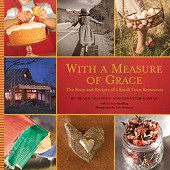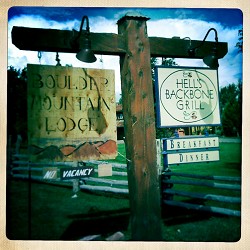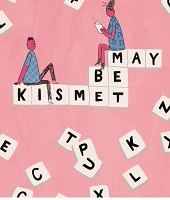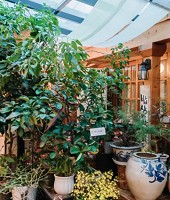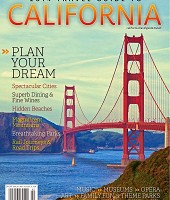Yoga Journal: “Flavor of Fall”
As the harvest season winds down, a desert cafe serves up creativity with its locally grown organic meals
by Lavinia Spalding (google+)The fall season for us here at Hell's Backbone Grill is a bit like an amusement park ride. In September the weather begins to cool, a second wave of wildflowers bloom, and the aspens on the mountain turn a fiery gold. Everything glimmers and sparkles magically, and we fall easily under the spell, blinded by flashes of yellow leaves against red sandstone. Apparently forgetting what this particular ride feels like, we gamely buy our tickets and climb aboard. And it's just lovely at first. On afternoon strolls we collect leaves and heart-shaped stones. And then, BAM! Someone flicks a switch and we're jerked forward, whipped around fiercely, hung upside down, and spun. Fall is our busiest season — and resistance? Futile.
The only course of action during these months is to surrender to the chaos. It's pandemonium from garden to dining room to kitchen. Every guidebook hails autumn as the time to visit Utah, and these instructions are dutifully obeyed by tourists, writers, bikers, and cyclists from all over.
ONE TOMATO AT A TIME
Autumn is also the time when, as co-owner Blake Spalding says, "that hole in the ground where we put money starts producing for us." That hole, our farm, represents vision, principles, commitment to environmental responsibility, plotting, determination, and extremely hard work. It does not, unfortunately represent a return on investment.
The fact is we'd save heaps of money if we purchased all our vegetables en masse from Somewhere Far Away. In Somewhere Far Away, everything is perpetually in season. We can have pink strawberries in November and orange pumpkins in May from Somewhere Far Away. And while Somewhere Far Away is unarguably a mysterious place, we regretfully decline — insofar as possible — to procure food from Somewhere Far Away. It costs us roughly the same to pull one ripe tomato from our garden as it does to order ten from Somewhere Far Away.
The fact that we continue to pull that one tomato and fight the temptation to order the other ten might suggest a lack of business sense. Not to us. We believe it to be a principal explanation for why Hell's Backbone Grill still breathes today. Food not grown in a hothouse and shipped thousands of miles is spared culture shock. It's fresh and real and more flavorsome.
We're especially careful not to grow anything we can't utilize. We're experimental but not frivolous, and more than anything, we're locally inspired. What we plant is suited to alkaline soil, sustainable, and easily grown in high desert.
"What's neat about the restaurant is that it gets people thinking about where their food comes from," says local resident Ana Rendon, one of our former gardeners. "They look out the window and see that they're eating vegetables and herbs from the garden just outside. Hopefully it's inspiring people to be more curious and to continue exploring the possibilities of growing their own food."
So, happily, the onset of fall invites, in addition to more customers, a bounty of produce. In spring and summer our gardeners are judicious harvesters, observing a delicate balance—picking enough to feed the day's customers but not overpicking, lest there isn't enough for tomorrow. In fall we're spared that worry. Aware that frost could kill the entire garden in a single night, we harvest like crazy— tomatoes, carrots, Swiss chard, cabbage, pumpkins, and several varieties of hard squashes. In the late months, we discuss the weather every day to determine the necessity of covering the gardens. Usually we do so, with old sheets and tablecloths, and make no mistake: it is a fantastic pain in the neck. The garden, for us, represents a potent metaphor for the commitment we keep to upholding our value system. It can often be difficult to maintain, and the rewards are seldom instant or even very apparent. But then we take the first bite of the first tomato and in a nanosecond remember why it all matters so much.
We strive to make the food we serve an honest reflection of our location, not only geographically but culturally and historically. Gardening, pickling, and canning are deep community traditions in Boulder, Utah — not merely as hobby but rather as necessity. The community largely comprises subsistence farmers with the resources to survive a year of privation. They keep gallons of grain in their basements, and their recipe for survival is stretching, stocking, and preserving. In efforts to observe and incorporate local traditions and beliefs, we've found many of them compatible to our own — the Mormon code of no poisons, for instance, includes pesticides and additives, and as a result many church members grow organically. Furthermore, we depend on all manner of rural wisdom and invaluable gardening advice dispensed from locals. No one in town puts a thing in the ground until Veda Behunin, a longtime local who's still gardening in her nineties, begins planting—which she won't do until the snow has melted in a certain notch on the mountains. Veda watches the notch from her house in town, and everyone in town watches her.
EATING IN THE MOMENT
We source locally to the best of our ability. On various levels this is gratifying — it endorses local commerce, and the produce tastes wonderful — but it's also unpredictable and a very in-the-moment method of running a restaurant. Yes, local honey tastes better. It also runs out. And if a local crop freezes and dies, we won't get our expected produce. One solution is to scamper to the phone and frantically order what we need from Somewhere Far Away. Sometimes there's no way around doing that, but more often we choose solution number two — change the menu and use something we do have. It works for us. We've eaten in restaurants where the menu items never change. And sure, the food always tastes good, but do we remember our meals? Not even hardly.
Our menu reflects the change of season as well. Cold weather warrants heartier food, so our recipes become a bit more involved and substantial. The rest of the year we serve our garden vegetables fresh and unadorned, but in the fall we love to make slow-roasted thyme carrots, butternut squash soup with sizzled sage, warm red cabbage salad with goat cheese, and maple-glazed squash rings. And for breakfast, an appropriately autumnal dish of dreamy, creamy, hot and steamy oatmeal served with caramelized apple compote.
October is busy, but we try to take time to host a Halloween party. Then we wind down to our last season hurrah, Thanksgiving weekend. We offer two seatings and serve everyone family-style, with dishes that have included chestnut-pumpkin soup, spinach salad with a warm pear vinaigrette, dried cherry and cranberry compote, red chile gravy, and for dessert, chocolate-chile pecan pie, pumpkin cheesecake, and Annie's orchard-roasted apple-pear cobbler.
Then it's over. We've somehow made it through to winter and finally have the doctor's permission to give "Helles" a sedative as we close the restaurant for three whole months.
We stumble off the amusement park ride, tired, ragged, dizzy, lightheaded, and wobbly. Our stomachs are turned inside out and our hair sticks up in odd places. At last we rest, as does our garden—until March, when we dig up the carrots, and start fresh.
View the complete article (PDF format)
Going: New Orleans, The Southern US City Where Jazz Was Born
Parents: I Grew Up in a Haunted House—Here’s What I Tell My Child About Ghosts
AFAR: Seoul Food
Off Assignment, Letter to a Stranger: “To the Shopkeeper in Fez”
The Bold Italic: “Working Three Jobs Nearly Killed Me”
AirBnB Magazine: “So I Slept in a ...Cave”
AAA Westways Magazine: “Korean Encore”
AFAR.com: “Everything You Need to Know About Jazz Fest”
AFAR.com: “Get Beyond the Beads: The 101 on Mardi Gras Throws”
AFAR.com: “The Art of Eating Crawfish in New Orleans”
AFAR.com: “Find New Orleans’s Soul at These 6 Mini-Museums”
Ms. Magazine: “Politics is on the Menu at Hell’s Backbone Grill”
AirBnB Magazine: “New Orleans for the Celebratory”
Off Assignment, Letter to a Stranger: “To the one who was supposed to get away”
Off Assignment, Letter to a Stranger: “To Old Johnny”
Viator: “Coming Full Circle”
World Hum: “How Korean Karaoke Changed my Life”
Independent Bookstore Day’s anthology: “My Lesson from Hell”
-
The New York Times, Modern Love: “Goodbye, My Fantasy Man”
I wasn’t willing to settle for less than kismet. But chasing a romantic illusion nearly kept me from finding love. -- The night I agreed to try online dating, I told my roommate Meghan I hoped I wouldn’t meet anyone because that wasn’t the kind of story . . .
-
River Teeth: A lot of Tomorrows
We are at the dinner table when my young son asks, “The day after a lot of tomorrows, will we build a treehouse?” I want to scoop him in my arms, this boy so eager and fresh, so tall his forehead meets my shoulder. If I could, I would lift his body above . . .
-
AFAR: Seoul Food
I still clearly remember my first meal in South Korea. I had just arrived in the country, fresh out of college and ready to begin a job teaching English. My new boss had whisked me from the airport to a barbecue restaurant, where I’d watched in panic as . . .
-
The New R&R
. . .
 Excerpt from With a Measure of Grace, published in Yoga Journal
Excerpt from With a Measure of Grace, published in Yoga Journal
